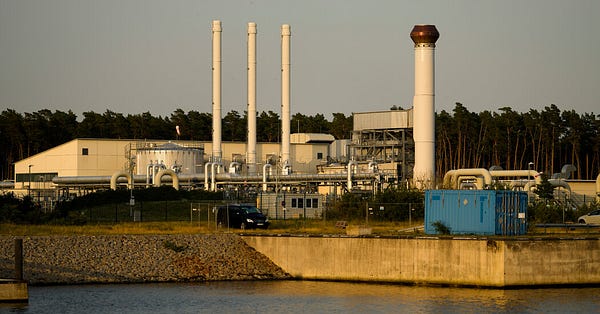Hey There,
I don’t usually write about natural gas and oil on Tuesdays, but things are developing quickly over in Europe and I’m concerned. If you don’t know there is a major natural gas pipeline called Nord Stream 1 that delivers natural gas to Germany, Europe’s largest economy and chemical producing powerhouse, and it’s been undergoing maintenance since July 11th. Maintenance is normal. A good preventative maintenance program keeps things running smoothly and it usually only last 10-12 days. Natural gas started flowing again on July 21st, but only at 40% of normal levels, which had started before the planned shutdown.
Nord Stream 1 has been operating at 40% capacity since mid June per reporting at the New York Times and this reduced amount of natural gas is starting to strike up some fear. When winter comes back in six months and demand for natural gas spikes the EU wants to have a plan. Their plan is to start gas rationing to build up a stockpile.
The Plan therefore proposes a voluntary gas demand reduction target of 15% from 1 August 2022 to 31 March 2023. To reach that target, it outlines various measures whereby Member States can encourage the decrease of gas demand and consumption by the public sector, businesses, as well as households. By the end of September, Member States are required to update their existing national emergency plans with their planned demand-reduction measures to meet this target.
ICIS ran a great podcast about what might happen to chemical markets in Europe too recently. The high level overview is that we might see more constraint on production due to rationing i.e. running 3 days/week instead of 5 days/week. This likely means higher overall prices for fertilizer and petrochemical raw materials. IF petrochemical sites do close it might take them 2-3 months to come back online. Further, I suspect all those employees working for German chemical companies are going to be getting paid even if those sites do idled. Storage for natural gas is at about 60-70% capacity, which I took for 30-40% empty and able to store.
Further, the Russian crude oil embargo is still set start December 5th. This means refineries will have to figure out other oil imports that will run similar to the current Russian crude oil. Imports will likely come from the US, South America, Africa, and the Middle East to make up the shortfall. This would be a great time to have those plastic pyrolysis plants that generate naphtha up a running.
Then, just as I thought I was wrapping this post up Gazprom decided to reduce the natural gas to Germany by even more: from 40% to 20% of total capacity.


Essentially this is what is happening and due to the German reliance on natural gas it’s getting contentious:
Gazprom: The Siemens turbines aren’t working and they need repairs. Going to have to send them to Canada to get fixed
Germany: Bullshit
Siemens: No Comment (Hey Gazprom we just sent you the paperwork to ship turbines to Canada)
No matter how you look at this problem this is not a good thing for the European chemical industry. The chemical industry is reliant of natural gas for two primary things:
Feedstock: steam reforming of methane to make carbon monoxide, steam cracking ethane/propane to make ethylene/propylene)
Steam generation: applying heat and performing #1
If you ever get a chance to hang out in a large scale chemical manufacturing operation the use of steam is everywhere. Steam is how heat gets moved around (heated oil is also used, but less common) and whenever you need steam it’s often generated at the site. If you want to run a distillation you need steam. If you want to steam crack some stuff, guess what, you need steam. If you want to run your reaction at 200 C or higher you need steam. Without steam the chemical industry for the most part stops running and without the raw materials to make stuff, which the chemical industry makes, then supply chains falter even more than they are now.
Hopefully someone figures out how to bypass steam and/or using natural gas for making steam. Anyone got ideas that aren’t nuclear?




Congrats on your new job, Tony.